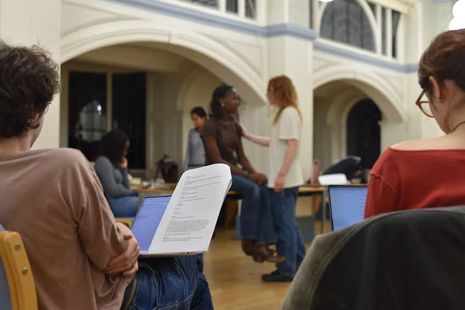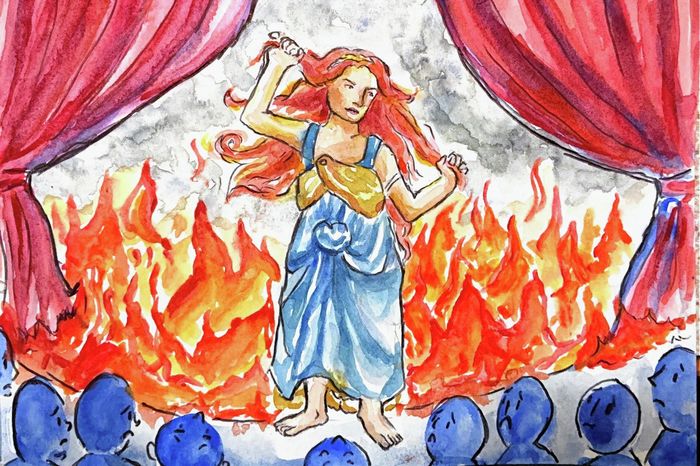The ambiguous world of Beneath The Flower
Eleanor Baldwin looks ahead to this upcoming student epic

I’ve always been struck by the line: “Look like the innocent flower, / But be the serpent under’t,” from Shakespeare’s Macbeth. Back in GCSEs, I once pinned an entire essay on it because it was the only line I could remember. Now, every time I see Beneath the Flower framed beautifully on posters around Cambridge, I am caught by the same sensation of intrigue and mystery that captured me then. In the Aula café of Trinity Hall, I sit down with the play’s writer and assistant director, Senan McSweeney-Davis, who begins with a brief plot summary.
Opening in media res, Beneath the Flower is set amid the turbulence of war between two ancient imperial powers: Carthage and the rising Roman Republic. At its centre is Sophonisba (Fareedah Ibrahim-Garba), a young noblewoman whose future is rewritten by a single political bargain: an arranged marriage with an enemy king. Forced to confront the uneasy boundaries of agency, identity, and loyalty, she must discover what power looks like for a woman caught between nations.
“Trying to do the editing process alone is so difficult … killing your darlings is such a real process”
Senan describes the moment “late in the library” when he decided to write this play, struck by inspiration from two terms spent “deeply entrenched” in classics and theatre. From the very beginning: “it has been a collaborative process,” he opens, finalising the script over the summer alongside director, Louisa Hailey, and assistant director, Thomas Gladstone. He notes how indispensable this support was: “trying to do the editing process alone is so difficult … killing your darlings is such a real process”. I am struck by this play’s collective effort, something which Senan made a very deliberative move to facilitate when he started writing, revealing his intentional decision to include little to no stage directions in the script. In his mind, this allows for the play to develop beyond a singular vision. Speaking later with Louisa only reinforced that point for me; as she put it, this “hasn’t been anyone’s one project”.
Prioritising racial and gender diversity both on and off stage, the show’s team aimed to create inclusive and multifaceted dialogue in all aspects of the production – especially given the play’s focus on power and identity. In the writing process, Senan emphasises giving every character “a distinct voice,” a focus that resonates with the gender dynamics this play explores; with men away at war, women must navigate a world irrevocably changed. “The norms of what was before are no longer,” Senan remarks. The audience is left to navigate this dissonance with the characters, the play unfolding in fragments, often placing the audience midway through conversations or in the middle of an action sequence. Reminiscent of classical tragedy, violent action is largely kept off stage, and the audience is “left to assume, or guess”. “If it was meant to be a historical play, it would be more sequential, but having these time jumps, having the war loom over but never be actually shown, opens the play up to more interpretation.” This fragmentation, Senan suggests: “makes the moments that are shown more important”. By refusing to give us everything, Beneath the Flower invites us to lean forward, to participate in the vision, to imagine what is happening just beyond the stage’s threshold.
“By refusing to give us everything, Beneath the Flower invites us to lean forward”
For Senan and Louisa, the balance between a historical source and modern reception is pertinent. Having drawn inspiration from the classical texts, namely Livy’s History of Rome, this is a dynamic that the script endeavours to capture. “I want them to seem very human and to be relatable, but also I want it to be clear that they aren’t modern people,” says Senan. Inevitably, these are characters living in a world with a different moral code to our own. The result is disarming and undeniably enticing: the tension between a classical morality and modern expectations that promises to be thrilling to watch. This play leans unapologetically into its ambiguity; mystery clings to its title, promising a world that dances along margins of truth and deception.
Senan points towards a broader moral interrogation between identity and intent, asking: “do the decisions we make always reflect who we are as people?” teasing a tension between the audience and the events onstage. My main hope is for people to have fun with it,” Senan tells me, “it would be my dream for people to discuss and disagree and argue”. This is a play that looks to thrive on interpretation: a story of women, war, and what lingers beneath the flower’s arresting face. As we close the interview, I am already reaching for a ticket, eager to have my place in this conversation.
Beneath the Flower is running at The Corpus Playroom between Tuesday 4th - Saturday 8th November at 7:00 pm.
 News / Judge Business School advisor resigns over Epstein and Andrew links18 February 2026
News / Judge Business School advisor resigns over Epstein and Andrew links18 February 2026 News / Gov grants £36m to Cambridge supercomputer17 February 2026
News / Gov grants £36m to Cambridge supercomputer17 February 2026 News / Union speakers condemn ‘hateful’ Katie Hopkins speech14 February 2026
News / Union speakers condemn ‘hateful’ Katie Hopkins speech14 February 2026 News / CUCA members attend Reform rally in London20 February 2026
News / CUCA members attend Reform rally in London20 February 2026 News / Right-wing billionaire Peter Thiel gives ‘antichrist’ lecture in Cambridge6 February 2026
News / Right-wing billionaire Peter Thiel gives ‘antichrist’ lecture in Cambridge6 February 2026










